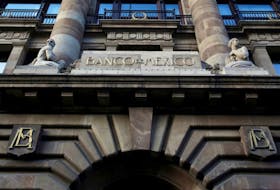WOLFVILLE, N.S. - When it comes to farming, Michael Lightfoot knows it’s best not to put all of his eggs – or grapes – in one basket.
The owner of Lightfoot and Wolfville Vineyards said that when grape growing started taking off in the Annapolis Valley, there were very few people involved who could say they were farmers first. He said farming is in his blood.
Lightfoot, a member of the Nova Scotia Grape Growers Association, said they were into other agricultural commodities before diversifying into grape growing and establishing Lightfoot and Wolfville Vineyards. He is a fourth-generation farmer on the same land and a seventh-generation farmer overall.
He said his grandfather was growing apples in the 1960s on land now occupied by one of Lightfoot’s vineyards. This was the only commodity his grandfather was involved with but there was a downturn in the industry and they were forced to sell a good portion of the farm. The family seized the opportunity to buy the land back about a decade ago.
“We planted our first vines in 2009 and we’ve been at it just under 10 years now,” Lightfoot said. “We’ve come a long way in 10 years but what the lesson that happened back in the 60s taught me was diversification was important on the farm.”
He learned that, if possible, it’s better to spread the risk out by investing in multiple commodities. They now have cattle, sheep, poultry and organic and biodynamic vineyards and feel that, overall, the farm is healthier because of this.

Lightfoot said the diversification into grapes and the winery was a sort of insurance policy and it was also about succession, as he has adult children who are working in the industry and who have a strong interest in it.
Initially, they grew grapes and shipped them to Benjamin Bridge winery. Lightfoot said that having put so much time, effort and love into growing the fruit, it was difficult seeing it leave the farm, even though they knew it was in very good hands. They wanted to have ultimate control of the product, right to the point where quality, award-winning wine is bottled and sold.
“We wanted also to create an atmosphere where people could come and enjoy this very particular piece of land,” Lightfoot said. “You can see the view and the proximity to the Town of Wolfville. We thought it was very important to be able to taste our wines in the area where they were produced.”
Lightfoot and Wolfville has 40 acres of estate spread over three vineyards and an eclectic variety of grapes, including Vinifera, Chardonnay, Pinot Noir, Riesling, L’Acadie Blanc and others. He said they have a big store and they like to concentrate on different varieties of wine so they can offer a wide portfolio to their customers – wines that can be appreciated by anyone.
Lightfoot said grapes are more sensitive to the cold than some other crops. Lightfoot and Wolfville has concentrated on those varieties with the best ability to overwinter. He said the growing season in the Valley is perfect if they can make it through the shoulder seasons with risks of early or late frosts and get through the winter without a lot of damage.
“Some varieties are more cold-sensitive than others, and so it’s really site-specific,” Lightfoot said. “You want to plant a vineyard close to a body of water to help regulate the winter temperature and you want to plant in a high location so that there is no cold air draining down around your vineyard, that’s preferable.”
He said they are fortunate to have such strong viticulture sites. They fared well through the freeze in early June but some of the growers that help supply them weren’t so fortunate. Some lost 20 to 100 per cent of this year’s crop, compared to a loss of approximately five to 10 per cent for Lightfoot and Wolfville.
He said grapes are a higher revenue commodity compared to others. Vineyards planted with Vinifera, for example, are providing high returns per acre. If the same land were producing hay, there would be no comparison.
However, the cost of establishing an acre of vines is such that you need a higher return and longevity to offset the investment. It can cost between $20,000 and $30,000 to get an acre of grapes established.
Lightfoot said they didn’t realize how good they had it when they started planting grapes. There are only a few places in the world that can produce even remotely as high a quality prestige cuvée sparkling wine as the Annapolis Valley, including a small pocket of England and Champagne, France.
“It’s our long falls and cool, moderate growing conditions that allow our grapes to not ripen too quickly but to actually ripen over many more months than they would in a hotter climate,” he said.
The grapes truly ripen on the vine, providing a higher, more complex flavour profile. In a hotter climate, to make sparkling wine, you would need to harvest the grapes earlier and “make additions or deletions in the cellar.”
Lightfoot said it’s the existing farmers who have the land most conducive to planting vineyards. He would suggest that they look at modern viticulture as a great option for diversifying their operations.
“There are opportunities out there that shouldn’t be overlooked,” he said.
For more information on Lightfoot and Wolfville Vineyards, visit https://lightfootandwolfville.com.

Perennia experts working with industry to improve grape, wine production
World-class wine experts are being drawn to Nova Scotia to help make a successful grape growing and wine production industry even better.
Francisco Diez, a viticulture specialist working with Perennia, said the industry in Nova Scotia has been progressing rapidly over the past 15 years. He said it’s being demonstrated that something new and different can be accomplished here. For example, Lightfoot and Wolfville has shown that it is possible to grow and ripen a range of European grape varieties here and produce very nice wines. The years ahead hold even more potential.
“I think we have a really bright future if we continue proving ourselves and making even more professional what we have done now. The quality can be even better than what we have right now,” he said.
Rodrigo Laytte, a terroir and winemaking consultant working with Perennia, said they’re currently studying the potential of the Valley region and other areas of the province to make very good wines.
They’re looking at ways to improve the quality and quantity of the wines produced and the goal is to “give Nova Scotia a wine with its own personality and spirit.” He said he is very proud to be participating in the project, the first terroir study of its kind to be conducted in Canada.
Read the entire BACK ON THE FARM SERIES: A collection devoted to a vital industry in the Annapolis Valley:
- Centre Burlington man discovers passion for oldfashioned farming
- Falmouth farmers shift focus to find the right balance
- Eating healthy on a budget not as difficult in the Valley as one may think: dietitian
- Reporter spends a day at TapRoot Farms in Port Williams
- Diversification key to success for Wolfville farmer who took on grape growing, established winery
- Lawrencetown greenhouse grower diversified into grapes
- Dempsey Corner Orchards farmer sees longevity in trying new things
- Coldbrook farmer proudly commits to the 24/7 lifestyle
- Woodville apple orchards lose UPick crop to June frost
- Keith Colwell pushing food security, farming as a career, capitalization of new opportunities
- Acadia University scholars share their thoughts on sustainability in farming
- COLUMN: Tractors, train changed county farming forever








